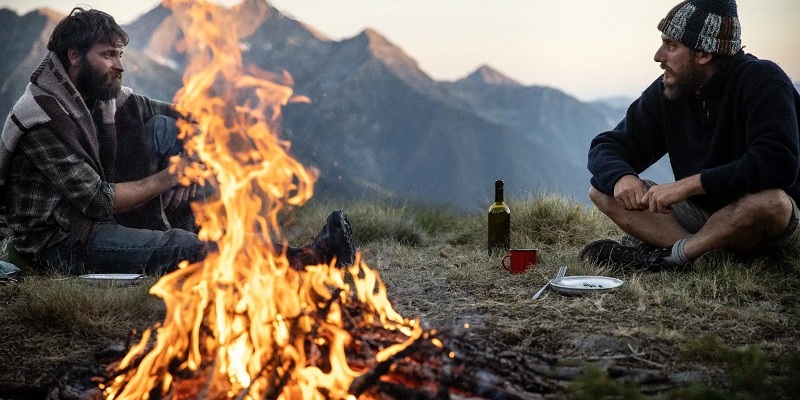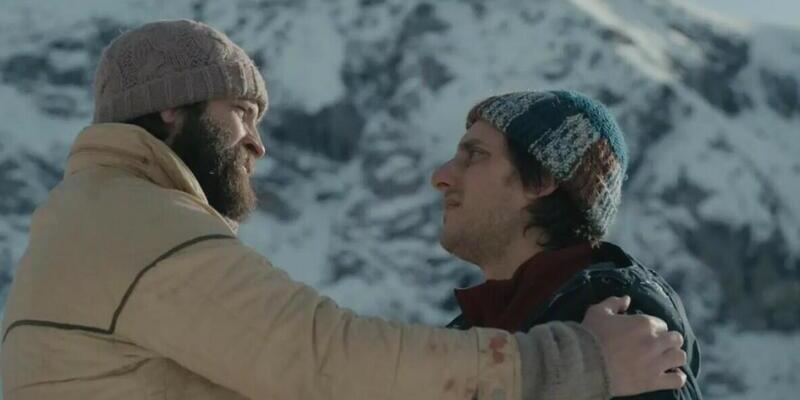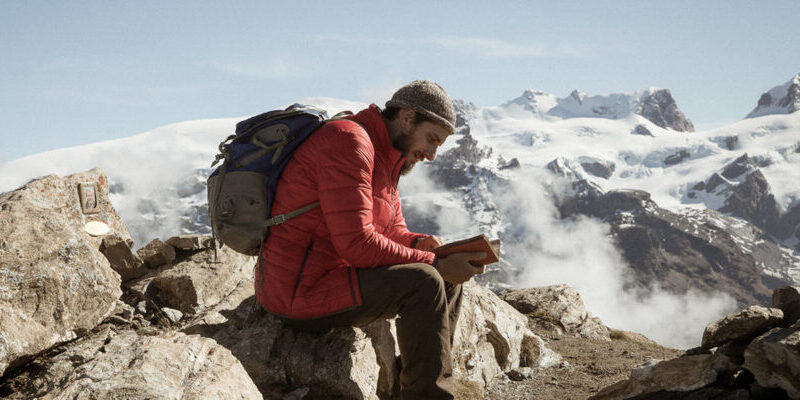
Review by
Benjamin Poole
Directed by: Felix van Groeningen, Charlotte Vandermeersch
Starring: Luca Marinelli, Alessandro Borghi, Filippo Timi, Elena Lietti, Elisabetta Mazzullo, Surakshya
Panta

As a suburban middle-class male of a particular vintage, it is my abiding
dream to one day have as my occasional home a wooden cabin positioned in
faraway mountains which overlook vast bluffs of purple rock and white
snow, same as it is for others of my basic ilk. You know, just being away
from everyone else so we can get on with the business of being
aspirational. By virtue of financial situations and the binding ties of
real life, however, as a consolation most of us will have to make do
with director/screenwriter duo Felix van Groeningen and
Charlotte Vandermeersch's tasteful literary adaptation
The Eight Mountains instead, coming soon to the art centres
we frequent every few months in search of tasteful, self-affirmingly
worthy cinema.

Paolo Cognetti's source material is a bildungsroman (of course it
is), and thus we open with young Pietro holidaying in the alps with his
family. In the pleasingly rustic village, there only appears to be one
other kid knocking about, Bruno, whom Pietro befriends and collaborates
with in the sort of picaresque which people always retrospectively wish
they'd had in their own childhoods: woodlands, exploring, building dams,
etc. Pietro's dad takes the boys on a more unique adventure, however, in
the form of a hike up one of the sizable mountain peaks that dwarf the
village: responsible. For the boys, the alpine incident instigates a
lifelong attachment to the mountain, a fixation potentially catalysed by
city kid Pietro stumbling when he attempts to leap the same ravine which
Bruno has just traversed with ease (the resonant monumentality of the
moment is better explicated in the novel, wherein Pietro more dramatically
hyperventilates). Are these domineering alpine edifices to become
metaphor, an opportunity to confirm masculine worth, or are they simply a
panoramic visual pleasure backdropping the bourgeois fairy tale about to
ensue?

Thing is, Pietro is URBANE and Bruno is POOR but the innocence of
childhood does not recognise such distinctions. It is the punitive adult
world and its pesky obligations which mean Bruno is made to stay in the
village and become a builder while Pietro goes off to be a filmmaker. I
liked this part because it meant that I could stroke my chin over the
plight of people less sophisticated and cosmopolitan than me - I mean,
Bruno's parents are so cartoonishly jejune that for some reason they
refute the attempts of Bruno's parents to teach their son literacy, the
unedified peasants. As the film went on though, I was equally thrilled to
patronisingly fetishise Bruno (Alessandro Borghi) as the sort of
rugged, capable outdoorsy type who I can only ever aspire towards, a
positioning which Pietro's (Luca Marinelli) enduring narrative
voiceover takes for granted.
Best of all was how the narrative was straightforwardly situated within
the sort of ubiquitously represented male anxieties I was able to
understand and self-importantly relate to. Early on, father complexes are
introduced when it is suggested that Pietro's dad is only really
actualised when he out having a walk (which is all a hike really is, let's
be honest) up the mountains. What is it with straight men and their
absolute obsession with getting away from their families? Via the
portentous narration, in The Eight Mountains there is a
given assumption that such quixotic pursuits are noble; alright, Casper
David Friedrich. The theme is developed when dad dies but leaves his son a
ruined shack within the snowy folds of the slopes, which Pietro
accordingly resolves to repair – the v/o lamenting "What else was I
supposed to do with his lost dream?" As their paths diverge, the boys
return annually as men to the location, which over time becomes the candle
glowed cabin of our cosy dreams.

Yes, Ruben Impens' photography is gorgeous, but you can't really go
wrong capturing such impressive scenery. And at two hours plus of such
snowy sumptuousness with very little substance beneath, altitude sickness
might well set in. The Eight Mountains is a cosy watch, an
unchallenging drama which plays into the travelogue ambitions of its
audience and offers homespun reassurance of certain values. Of course life
moves on, and friendships change, and mountains are pretty: presenting
such obvious truths are not especially insightful. Over its extended
running time, The Eight Mountains' photogenic philosophising is executed in a manner very similar to
hiking a mountain: slowly, very slowly. Nonetheless, Bruno and Pietro's
companionship is the pinnacle of the film, a symbiosis authentically
characterised by the fraternity and competition which typifies male
friendship. The requisite ups and downs (again, a bit like hiking, etc)
lead towards a tragic ending which serves to provide one of the two main
characters with an important life lesson. Can you guess which one?

The Eight Mountains is on MUBI UK
now.
